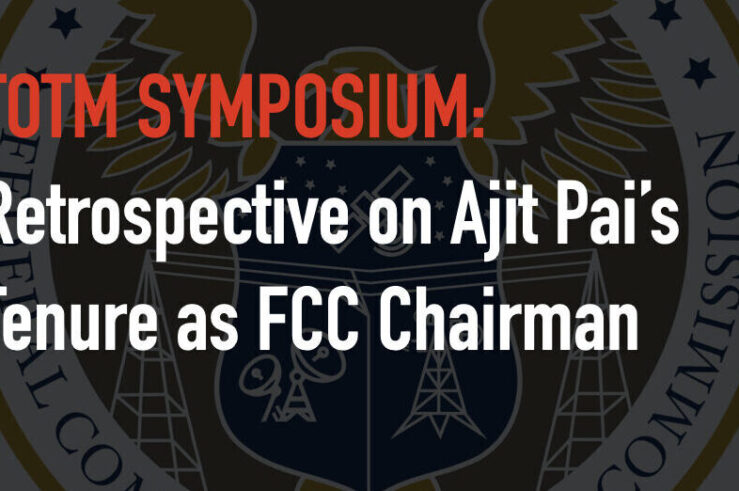Showing archive for: “Efficiencies”
Alston Decision Shows Consumer Welfare Standard Isn’t Broken
From Sen. Elizabeth Warren (D-Mass.) to Sen. Josh Hawley (R-Mo.), populist calls to “fix” our antitrust laws and the underlying Consumer Welfare Standard have found a foothold on Capitol Hill. At the same time, there are calls to “fix” the Supreme Court by packing it with new justices. The court’s unanimous decision in NCAA v. ... Alston Decision Shows Consumer Welfare Standard Isn’t Broken
Dynamic Merger Efficiencies: The Case of Pharmaceutical Markets
The recent launch of the international Multilateral Pharmaceutical Merger Task Force (MPMTF) is just the latest example of burgeoning cooperative efforts by leading competition agencies to promote convergence in antitrust enforcement. (See my recent paper on the globalization of antitrust, which assesses multinational cooperation and convergence initiatives in greater detail.) In what is a first, ... Dynamic Merger Efficiencies: The Case of Pharmaceutical Markets
The Supreme Court Misses the Big Consumer Welfare Picture in NCAA v. Alston
In its June 21 opinion in NCAA v. Alston, a unanimous U.S. Supreme Court affirmed the 9th U.S. Circuit Court of Appeals and thereby upheld a district court injunction finding unlawful certain National Collegiate Athletic Association (NCAA) rules limiting the education-related benefits schools may make available to student athletes. The decision will come as no ... The Supreme Court Misses the Big Consumer Welfare Picture in NCAA v. Alston
NY ‘Abuse of Dominance’ Bill Attacks Consumer Welfare and the US Antitrust Tradition
U.S. antitrust law is designed to protect competition, not individual competitors. That simple observation lies at the heart of the Consumer Welfare Standard that for years has been the cornerstone of American antitrust policy. An alternative enforcement policy focused on protecting individual firms would discourage highly efficient and innovative conduct by a successful entity, because ... NY ‘Abuse of Dominance’ Bill Attacks Consumer Welfare and the US Antitrust Tradition
Four Reasons to Reject Neo-Brandeisian Critiques of the Consumer Welfare Approach to Antitrust
In the battle of ideas, it is quite useful to be able to brandish clear and concise debating points in support of a proposition, backed by solid analysis. Toward that end, in a recent primer about antitrust law published by the Mercatus Center, I advance four reasons to reject neo-Brandeisian critiques of the consensus (at ... Four Reasons to Reject Neo-Brandeisian Critiques of the Consumer Welfare Approach to Antitrust
The Problem of Data Property Rights
Policy discussions about the use of personal data often have “less is more” as a background assumption; that data is overconsumed relative to some hypothetical optimal baseline. This overriding skepticism has been the backdrop for sweeping new privacy regulations, such as the California Consumer Privacy Act (CCPA) and the EU’s General Data Protection Regulation (GDPR). ... The Problem of Data Property Rights
How Antitrust Regulators Could Use the ‘Perpetual Inventory Method’ to Value R&D
The slew of recent antitrust cases in the digital, tech, and pharmaceutical industries has brought significant attention to the investments many firms in these industries make in “intangibles,” such as software and research and development (R&D). Intangibles are recognized to have an important effect on a company’s (and the economy’s) performance. For example, Jonathan Haskel ... How Antitrust Regulators Could Use the ‘Perpetual Inventory Method’ to Value R&D
The Ajit Pai FCC on Radio Spectrum Allocations
Disclosure: The one time I met Ajit Pai was when he presented a comment on my book, “The Political Spectrum,” at a Cato Institute forum in 2018. He was gracious, thorough, and complimentary. He said that while he had enjoyed the volume, he hoped not to appear in upcoming editions. I took that to imply ... The Ajit Pai FCC on Radio Spectrum Allocations
Ajit Pai Brought the FCC’s Media Ownership Rules into the Modern Age
I’m delighted to add my comments to the chorus of voices honoring Ajit Pai’s remarkable tenure at the Federal Communications Commission. I’ve known Ajit longer than most. We were classmates in law school … let’s just say “many” years ago. Among the other symposium contributors I know of only one—fellow classmate, Tom Nachbar—who can make ... Ajit Pai Brought the FCC’s Media Ownership Rules into the Modern Age
The Antitrust Prohibition of Favoritism, or the Imposition of Corporate Selflessness
It is my endeavor to scrutinize the questionable assessment articulated against default settings in the U.S. Justice Department’s lawsuit against Google. Default, I will argue, is no antitrust fault. Default in the Google case drastically differs from default referred to in the Microsoft case. In Part I, I argue the comparison is odious. Furthermore, in ... The Antitrust Prohibition of Favoritism, or the Imposition of Corporate Selflessness
Facebook and the Pros and Cons of Ex Post Merger Reviews
The Federal Trade Commission and 46 state attorneys general (along with the District of Columbia and the Territory of Guam) filed their long-awaited complaints against Facebook Dec. 9. The crux of the arguments in both lawsuits is that Facebook pursued a series of acquisitions over the past decade that aimed to cement its prominent position ... Facebook and the Pros and Cons of Ex Post Merger Reviews
The Limits of Rivalry
I am left wondering, however, if he’s misdiagnosed the problem – or at least whether the cure he offers would be seen as sufficient by those most vocally asserting that antitrust is failing. And, of course, I recognize that his objective in writing this book is not to bring harmony to a deeply divided debate, ... The Limits of Rivalry












